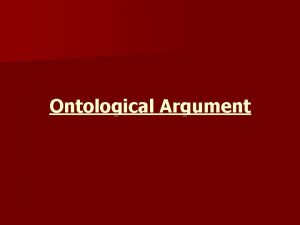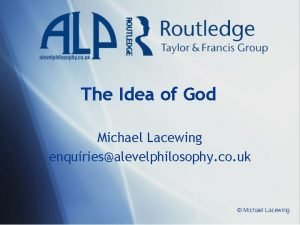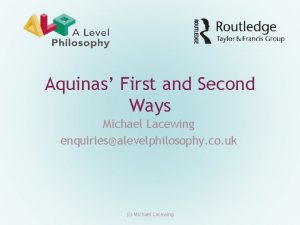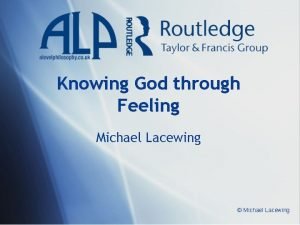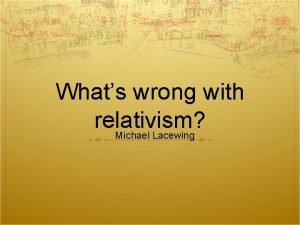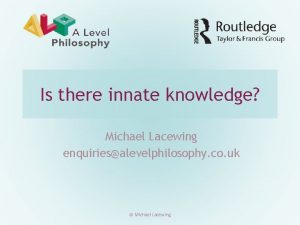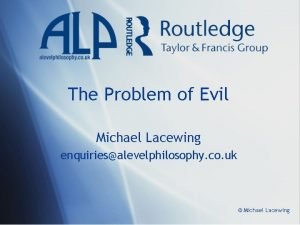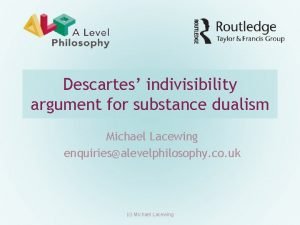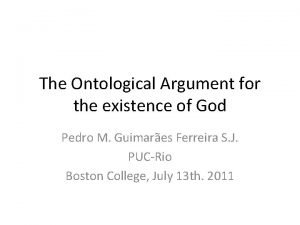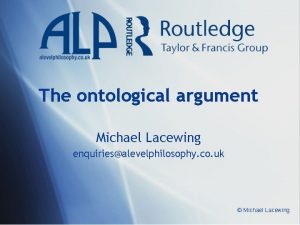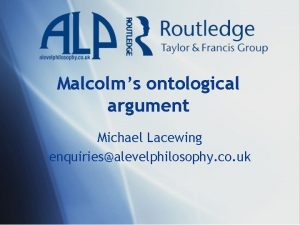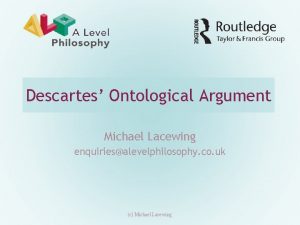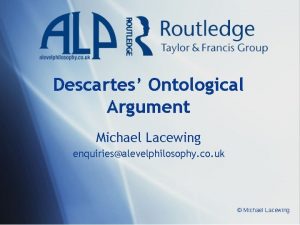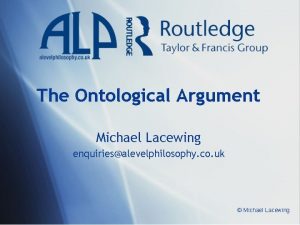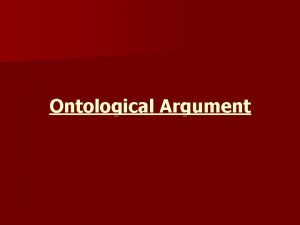Malcolms ontological argument Michael Lacewing enquiriesalevelphilosophy co uk










- Slides: 10

Malcolm’s ontological argument Michael Lacewing enquiries@alevelphilosophy. co. uk (c) Michael Lacewing

Necessary existence • ‘God is the greatest possible being’ is a logically necessary truth – It is part of our concept of God • A being that depends on something for its existence is not as great as one that doesn’t. • Therefore, God’s existence cannot depend on anything. • If God exists, then God’s existence is necessary. (c) Michael Lacewing

Anselm’s second version of the argument • Think of two almost identical beings, X and Y. – X is a being which we can conceive not to exist – Y’s not existing is inconceivable – Y is greater than X • The greatest conceivable being is a being who, we conceive, must exist. • This does not compare a being that exists with one that doesn’t, but two types of existence – necessary and contingent (c) Michael Lacewing

Malcolm’s argument • Either God exists or God does not exist. • God cannot come into existence or go out of existence. • If God exists, God cannot cease to exist. • Therefore, if God exists, God’s existence is necessary. • If God does not exist, God cannot come into existence. • Therefore, if God does not exist, God’s existence is impossible. • Therefore, God’s existence is either necessary or impossible. (c) Michael Lacewing

The argument • God’s existence is only impossible if the concept of God is self-contradictory. • The concept of God is not self-contradictory. • Therefore, God’s existence is not impossible. • Therefore, God exists necessarily. (c) Michael Lacewing

Is GOD a logically coherent concept? • Is the concept of God logically incoherent? • Are the attributes of God coherent? • Does it make sense to suppose a being that exists necessarily, if it exists at all? (c) Michael Lacewing

Malcolm on Kant’s objection • Kant famously objected that existence cannot be part of the concept of God. – An analytic truth unpacks a concept. The predicate tells you something about the subject. – To say ‘x exists’ is not to describe x at all or explain what x is. Existence is not part of the concept of anything. • Reply: This doesn’t apply to necessary existence – To say that ‘God exists necessarily’ is to unpack the concept of God. (c) Michael Lacewing

Discussion • Malcolm: If it is part of our concept that God exists necessarily, then we must accept that ‘God exists necessarily’ is an analytic truth – So it isn’t possible that God doesn’t exist • Kant: no, the analytic truth is ‘If God exists, then God exists necessarily’ – This doesn’t entail that God exists • Malcolm: It does. If God exists necessarily, then God does not depending on anything, and has neither beginning nor end. So it is either necessarily true or necessarily false that God exists, and it is not necessarily false. (c) Michael Lacewing

Objection • Obj: if God doesn’t exist, then it is impossible for God to be brought into existence. But this impossibility isn’t the same as it being impossible for God to exist. – If God doesn’t exist, it is this fact – not the concept of God – that makes God’s existence impossible. • Whether God’s existence is possible depends upon whether God exists or not! (c) Michael Lacewing

Objection • The correct conclusion of Malcolm’s argument is ‘If God doesn’t exist, then God’s existence is impossible; and if God does exist, then God exists necessarily’. • Not depending on anything characterises the nature of God’s existence, if God exists. But existence doesn’t characterise God. (c) Michael Lacewing
